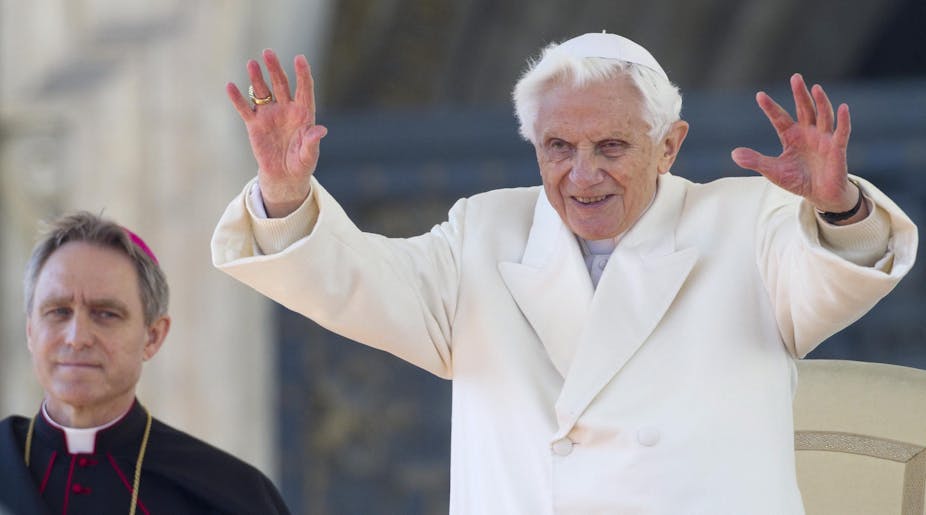Not a day goes by without further allegations of rape and sexual abuse being made against the Catholic Church. The vast majority of accusations relate to abuse perpetrated outside the Vatican’s walls, in dioceses around the world. Evidence suggests, however, that high ranking members of the Church’s hierarchy were well aware of these despicable acts and actively shielded the perpetrators from criminal investigations. This has led to repeated calls for Benedict XVI to be held personally accountable for the grave harm inflicted on innumerable children.
To date, attempts to prosecute Benedict have been stymied by his immunity as the Head of State of the Vatican City. His resignation, however, changes the game and opens up the possibility that warrants will now be issued for his arrest.
Prosecuting a former head of state
The status of the Holy See and the Vatican under international law is anomalous. But for all intents and purposes, the Vatican City has been equated to a sovereign state since the Lateran Treaty of 1929, with the Pope as its head. International law accords complete immunity to heads of state from the jurisdiction of other states while they are in office. They retain this immunity with respect to acts performed in an official capacity even after leaving office.

But as the extradition proceedings of Augusto Pinochet in the UK demonstrated, the immunity enjoyed by former heads of state with respect to official acts is not absolute. In particular, it does not extend to the most serious offences under international law such as genocide, crimes against humanity, war crimes and torture.
A reasonable argument can be made that abuse perpetrated within the Catholic Church amounts to crimes against humanity. In international criminal law, this offence includes rape and other forms of sexual violence when committed as part of a widespread or systematic attack against a civilian population.
Given the substantial evidence of pervasive sexual abuse within the Catholic Church across the globe, it is not difficult to see how a court could conclude that such acts are widespread and therefore fall within the definition of crimes against humanity.
Personal liability
As well as meeting the elements of this definition, a court would also have to determine exactly how Benedict himself could be held liable for such acts. There appears to be no evidence to suggest that he was personally involved in the perpetration of any acts of abuse.
However, international law has developed the doctrine of superior responsibility to address the role of persons of authority for the conduct of their subordinates. Three key elements would have to be met for Benedict to be held liable under this doctrine:
- He had “effective control” over the subordinates who committed the crimes
- He knew, or should have known, that such crimes were being committed by his subordinates
- He failed to take feasible measures to prevent or punish the commission of the crimes.
The first of these conditions is the most difficult to satisfy, as Church officials have been at pains to point out that Catholic priests are employees of individual dioceses. Nevertheless, Benedict had control over Church policy on sexual abuse both during his tenure as Pope and in his earlier role as head of the Congregation for the Doctrine of the Faith, the institution within the Catholic Church responsible for addressing sexual abuse and rape cases. Given his undoubted influence within the Church, this might be sufficient.
The other two elements of superior responsibility are likely to be more easily satisfied. Reports show Benedict was provided with documentary evidence about the scope and scale of the abuses within the Church, and he failed to prevent and punish the perpetrators of the crimes. To the contrary, Benedict frustrated police attempts to stamp out abuse and set Church policy that required the perpetrators to be warned, rebuked, prayed for or shifted to other parishesbut not handed over to law enforcement authorities.

The chance of a charge
In light of this prima facie legal case against the Pope, his resignation opens up the very real possibility of charges being brought against him.
But which courts would hear the case? International law recognises the authority of every state to prosecute offences that have been directed against its nationals. Accordingly, every state where sexual abuse in the Catholic Church has been uncovered during Benedict’s tenure has the power to charge him.
On top of that, many countries (including Australia) have in place legislation that enables individuals to be prosecuted for the most serious international crimes regardless of their nationality and regardless of where the crime was committed. International law permits this in view of the abhorrent nature of the offences in question.
Basic notions of fairness and the strictures of human rights law require a defendant to be present at his or her trial. With respect to Benedict, this may well prove a fatal difficulty. The territory of the Vatican is treated as the territory of a sovereign state. Thus, neither the Italian police nor the law enforcement authorities of any other state can enter the Vatican without consent of the Church authorities. Such consent is unlikely to be forthcoming.
It is equally improbable for the Vatican to agree to extradite the Pontiff Emeritus. Benedict will therefore be quite safe as long as he spends his retirement days within the confines of the Vatican. But should he wish to pay a visit to his native Germany, or even have a stroll outside the Vatican City walls, he would do well to take legal advice.

